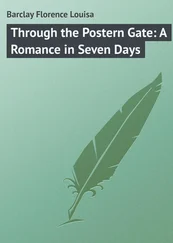Florence Barclay - The Following of the Star - A Romance
Здесь есть возможность читать онлайн «Florence Barclay - The Following of the Star - A Romance» — ознакомительный отрывок электронной книги совершенно бесплатно, а после прочтения отрывка купить полную версию. В некоторых случаях можно слушать аудио, скачать через торрент в формате fb2 и присутствует краткое содержание. Жанр: foreign_antique, foreign_prose, на английском языке. Описание произведения, (предисловие) а так же отзывы посетителей доступны на портале библиотеки ЛибКат.
- Название:The Following of the Star: A Romance
- Автор:
- Жанр:
- Год:неизвестен
- ISBN:нет данных
- Рейтинг книги:4 / 5. Голосов: 1
-
Избранное:Добавить в избранное
- Отзывы:
-
Ваша оценка:
- 80
- 1
- 2
- 3
- 4
- 5
The Following of the Star: A Romance: краткое содержание, описание и аннотация
Предлагаем к чтению аннотацию, описание, краткое содержание или предисловие (зависит от того, что написал сам автор книги «The Following of the Star: A Romance»). Если вы не нашли необходимую информацию о книге — напишите в комментариях, мы постараемся отыскать её.
The Following of the Star: A Romance — читать онлайн ознакомительный отрывок
Ниже представлен текст книги, разбитый по страницам. Система сохранения места последней прочитанной страницы, позволяет с удобством читать онлайн бесплатно книгу «The Following of the Star: A Romance», без необходимости каждый раз заново искать на чём Вы остановились. Поставьте закладку, и сможете в любой момент перейти на страницу, на которой закончили чтение.
Интервал:
Закладка:
Florence L. Barclay
The Following of the Star: A Romance
GOLD
CHAPTER I
THE STILL WATERS OF BRAMBLEDENE
David Rivers closed his Bible suddenly, slipped it into the inner pocket of his coat, and, leaning back in his armchair, relaxed the tension at which he had been sitting while he mentally put his thoughts into terse and forcible phraseology.
His evening sermon was ready. The final sentence had silently thrilled into the quiet study, in the very words in which it would presently resound through the half-empty little village church; and David felt as did the young David of old, when he had paused at the brook and chosen five smooth stones for his sling, on his way to meet the mighty champion of the Philistines. David now felt ready to go forward and fight the Goliath of apathy and inattention; the life-long habit of not listening to the voice of the preacher, or giving any heed to the message he brought.
The congregation, in this little Hampshire village church where, during the last five weeks, David had acted as locum-tenens, consisted entirely of well-to-do farmers and their families; of labourers, who lounged into church from force of habit, or because, since the public-houses had been closed by law during the hours of divine service, it was the only warmed and lighted place to be found on a Sunday evening; of a few devout old men and women, to whom weekly church-going, while on earth, appeared the only possible preparation for an eternity of Sabbaths in the world to come; and of a fair sprinkling of village lads and lassies, who took more interest in themselves and in each other than in the divine worship in which they were supposed to be taking part.
The two churchwardens, stout, florid, and well-to-do, occupied front pews on either side of the centre; Mr. Churchwarden Jones, on the right; Mr. Churchwarden Smith, on the left. Their official position lent them a dignity which they enjoyed to the full, and which overflowed to Mrs. Jones and Mrs. Smith, seated in state beside them. When, on "collection Sundays," the churchwardens advanced up the chancel together during the final verse of the hymn, and handed the plates to the Rector, their wives experienced a sensation of pride in them which "custom could not stale." They were wont to describe at the Sunday midday dinner or at supper, afterwards, the exact effect of this "procession" up the church, an oft-told tale for which they could always be sure of at least one interested auditor.
Mr. Churchwarden Jones bowed when he delivered the plate to the Rector. Mr. Churchwarden Smith did not bow, but kept himself more erect than usual; holding that anything in the nature of a bow, while in the House of God, savoured of popery.
This provided the village with a fruitful subject for endless discussion. The congregation was pretty equally divided. One half approved the stately bow of Mr. Churchwarden Jones, and unconsciously bowed themselves, while they disregarded their hymn-books and watched him make it. The other half were for "Smith, and no popery," and also sang of "mystic sweet communion, with those whose rest is won," without giving any thought to the words, while occupied in gazing with approval at Farmer Smith's broad back, and at the uncompromising stiffness of the red neck, appearing above his starched Sunday collar.
Mrs. Smith secretly admired Mr. Jones's bow, and felt that her man was missing his chances for a silly idea; but not for worlds would Mrs. Smith have admitted this; no, not even to her especial crony, Miss Pike the milliner, who had once been to Paris, and knew what was what.
The venerated Rector, father of his people, always bowed as he received the plates from the two churchwardens. But then, that had nothing whatever to do with the question, his back being to the Table. Besides, the Rector, who had christened, confirmed, married, and buried them, during the last fifty years, could do no wrong. They would as soon have thought of trying to understand his sermons, as of questioning his soundness. "The Rector says," constituted a final judgment, from which there was no appeal.
As he slowly and carefully mounted the pulpit stairs, one hand grasping the rail, the other clasping a black silk sermon-case, the hearts of his people went with him.
The hearts of his people were with him, as his silvery hair and benign face appeared above the large red velvet cushion on the pulpit desk; and the minds of his people were with him, until he had safely laid his sermon upon the cushion, opened it, and gently flattened the manuscript with both hands; then placed his pocket-handkerchief in the handy receptacle specially intended to contain it, and a lozenge in a prominent position on the desk. But, this well-known routine safely accomplished, they sang a loud amen to the closing verse of "the hymn before the sermon," and gave their minds a holiday, until, at the first words of the ascription, they rose automatically with a loud and joyous clatter to their feet, to emerge in a few moments into the fresh air and sunshine.
A perplexing contretemps had once occurred. The Rector's gentle voice had paused in its onward flow. It was not the usual lozenge-pause. Their subconscious minds understood and expected that. But, as a matter of fact, the Rector had, on this particular Sunday, required a second lozenge towards the end of the sermon, and the sentence immediately following this unexpected pause chanced to begin with the words: "And now to enlarge further upon our seventh point." At the first three words the whole congregation rose joyfully to their feet; then had to sit down abashed, while the Rector hurriedly enlarged upon "our seventh point." It was the only point which had as yet penetrated their intelligence.
In all subsequent sermons, the Rector carefully avoided, at the beginning of his sentences, the words which had produced a general rising. He would smile benignly to himself, in the seclusion of his study, as he substituted, for fear of accidents, "Let us, my brethren," or "Therefore, belovèd."
It never struck the good man, content with his own scholarly presentment of deep theological truths, that the accidental rising was an undoubted evidence of non-attention on the part of his congregation. He continued to mount the pulpit steps, as he had mounted them during the last fifty years; attaining thereby an elevation from which he invariably preached completely over the heads of his people.
In this they acquiesced without question. It was their obvious duty to "sit under" a preacher, not to attempt to fathom his meaning; to sit through a sermon, not to endeavour to understand it. So they slumbered, fidgeted, or thought of other things, according to their age or inclination, until the ascription brought them to their feet, the benediction bowed them to their knees, and the first strident blasts of the organ sent them gaily trooping out of church and home to their Sunday dinners, virtuous and content.
Into this atmosphere of pious apathy, strode David Rivers; back on sick-leave from the wilds of Central Africa; aflame with zeal for his Lord, certain of the inspiration of his message; accustomed to congregations to whom every thought was news, and every word was life; men, ready and eager to listen and to believe, and willing, when once they had believed, to be buried alive, or tied to a stake, and burned by slow fire, sooner than relinquish or deny the faith he had taught them.
But how came this young prophet of fire into the still waters of our Hampshire village? The wilds of the desert, and the rapid rushings of Jordan, are the only suitable setting for John the Baptists in all ages.
Nevertheless to Hampshire he came; and it happened thus.
Influenza, which is no respecter of persons, attacked the venerated Rector.
Читать дальшеИнтервал:
Закладка:
Похожие книги на «The Following of the Star: A Romance»
Представляем Вашему вниманию похожие книги на «The Following of the Star: A Romance» списком для выбора. Мы отобрали схожую по названию и смыслу литературу в надежде предоставить читателям больше вариантов отыскать новые, интересные, ещё непрочитанные произведения.
Обсуждение, отзывы о книге «The Following of the Star: A Romance» и просто собственные мнения читателей. Оставьте ваши комментарии, напишите, что Вы думаете о произведении, его смысле или главных героях. Укажите что конкретно понравилось, а что нет, и почему Вы так считаете.











